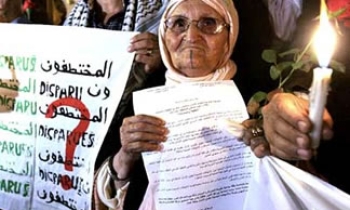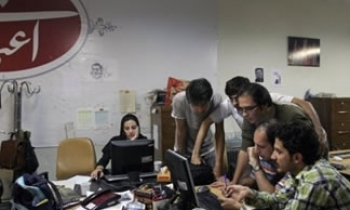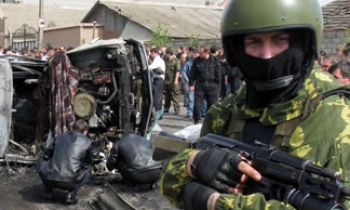BAGHDAD -- The recent killings of six Iraqi journalists have rattled the country's fledgling press corps, a battle-worn crew that has persisted in covering the nation's turmoil while suffering dozens of dead at the hands of insurgents, government troops and even American forces.
"We are scared working as journalists," said Thamer, a burly radio reporter, sitting in the threadbare cafe of the al-Hamra hotel. "There is no protection and we are well-known people, easy to get to."
Reporters Without Borders counts 68 reporters and cameramen killed so far trying to cover Iraq at war; if translators and other assistants are counted the total is 86, making this the deadliest conflict for journalists since World War II.
Some are simply caught in the crossfire between insurgents, militias, and government and U.S. forces. Others are deliberately targeted because something they wrote annoys one or another armed group.
Thamer, who does political coverage for Free Iraq radio and asked that only his first name be used, said he has not personally received a death threat, but has friends who have. "They get an envelope with a bullet inside, left in front of the house or inside the house," he said.
Iraqi media culture is much changed from what it was under the rule of Saddam Hussein, but still far from the independent and ostensibly objective press familiar to Americans.
Under Saddam, there were three televisions stations, two controlled by Saddam's son Uday, and one run by Saddam's Ba'ath party. The five newspapers and four radio stations were also under government control.
Today, there are roughly 20 newspapers, some 12 radio stations and about 18 television stations, including international satellite channels. But each newspaper and local radio and television channel is owned by a political party or religious group, serving as a mouthpiece for its owners.
One Iraqi reader, Abu Yusef, said he buys five or six papers every day to find out what is going on in his splintered country. "I read the extreme ones because I want to hear what the enemy is saying," he said.
But a friend said he ignores the politics and reads the horoscopes, or the government paper Sabah because it has a sports section.
"Newspapers are also very useful back home. They are used to clean the windows, or as a tablecloth. It's funny, but it is the truth," Abu Yusef said.
Funny perhaps, but it remains a serious business for the reporters, many of whom have quit or moved their families out of the country.
Photographer Akram Saleh, 31, moved his family to Syria after a friend was taken hostage last month. "I am also thinking of leaving my job, and the country, until everything gets back to its place," said Mr. Saleh, a rail-thin man who works for the worldwide photo agency Getty.
Working for Reuters news agency before the war, Mr. Saleh said, he was always aware that his work was partly controlled by Saddam's Ministry of Information, and that he had to be wary of the feared intelligence agency.
"Now, Americans can kill you, the mujahedeen can kill you, the militia can kill you, the Iraqi police, the Iraqi army can kill you, gangsters and kidnappers can kill you," he said inside the hotel room that serves as the agency's bureau.
U.S. forces acknowledge that journalists have died at American hands -- Reporters Without Borders and the Committee to Protect Journalists put the number at between 10 and 13 -- but say it was never deliberate.
"There have been Iraqi journalists who have been killed who are out when engagements are occurring ... or who appear to be a threat when coming up to a checkpoint," said Lt. Col. Barry Johnson, spokesman at the Multi-National Force-Iraq in Baghdad.
"Journalists are never targeted, never have been targeted and never will be targeted," he added. "But certainly they place themselves in very dangerous circumstances."
For the insurgents and militias who kill on purpose, the biggest targets are Iraqis working for foreign news organizations. Those reporters who have not quit are fatalistic and determined.
Thamer's mother, father and wife have begged him to leave his job. Citing the Koran, he has responded that death can come into even a protected castle.
And he loves the work. "It takes me close to the decision making. And to be honest, the money helps, too," he said.
But after just three years, the stress is beginning to show. "I am 29, but I feel 40. I feel old," Thamer said.









